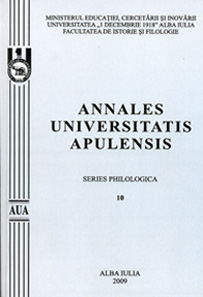GEHÖRT DIE ZUKUNFT DER FREMDSPRACHENLEHRE DEM „E-LEARNING“ BEGRIFF?
DOES THE FUTURE OF THE FOREIGN LANGUAGE APPRENTICESHIP BELONG TO THE "E-LEARNING" UNDERSTANDING?
Author(s): Valentin TodescuSubject(s): Foreign languages learning
Published by: Universitatea »1 Decembrie 1918« Alba Iulia
Keywords: e-learning; software programmes; education; opportunities
Summary/Abstract: For more than two decades there have been attempts in making the computer a kind of device which should help students and adults learning the foreign languages. If in the 90s the educational software programmes did not be considered to be relevant and serious, nowadays e-learning registers a real boom, and this fact is a consequence of the information technology usage as a common learning process. The software used in the study of the foreign languages can include without any problem all kinds of exercises well-known in the process of teaching foreign languages, and more than that, audio- video materials. This will definitely makes both the teacher and the student’s work easier. The benefit of using these kinds of educational software is that they are very interactive and therefore, the learning activity becomes itself more attractive for all the categories of pupils, students and adults, as well. What we have to take into account in the case of the students is that these programmes should be in direct concordance with the curriculum, on the one hand, and that they should support it, on the other hand. So, if the student wants to do extra work he is no longer supposed to use other workbooks or student’s books, he can easily access such software in order to improve his skills. The e-learning programmes used in the study of the foreign languages have a greater impact upon the adults, as well; for these ones the e-learning software do not seem as being very attractive, what really interests them is practising when their time allows that. Due to the mobility existent in the economic and industrial area, more and more adults need to know and improve a foreign language but many of them are confronting themselves with the problem of time. The computer is that kind of device which eliminate this particular problem because the e-learning programmes can be accessed whenever the user wants to do that. More than that, we can say that, it is almost impossible in the case of for the businessmen to participate in such an activity, so, consequently the computer remains their single option. Even in the evening when they get into the hotel room the e-learning programmes can be accessed on their laptops. But there are some disadvantages in using these electronic resources, one of these being the fact that if the student has some misunderstandings then there is no teacher to clarify his problems. Therefore, the suppliers of these educational programmes in terms of foreign languages study should also offer a kind of online service consisting in teaching staff that is permanently connected to their students. We must say that nowadays there are a great number of e-learning suppliers in the domain of foreign languages and that there are great differences concerning the quality provided by these software programmes. The most qualitative ones are very expensive as there are a great number of specialists involved in this type of activity.
Journal: Annales Universitatis Apulensis. Series Philologica
- Issue Year: 11/2010
- Issue No: 3
- Page Range: 356-362
- Page Count: 7
- Language: German

